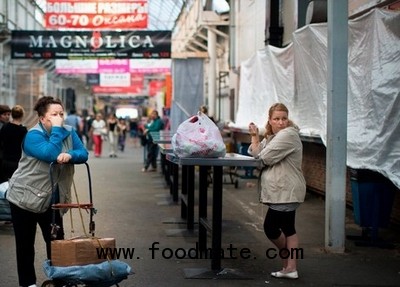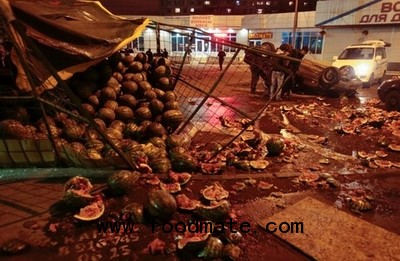An angry crowd of residents from the nearby West Biryulyovo district and aggressive neo-Nazis from other areas stormed the market on Sunday.
Witnesses described the alleged perpetrator as a "non-Russian." An Azerbaijani man has been arrested for the crime, and Russian officials say he confessed to killing the man in self-defense.
But to many it seemed obvious that the murderer would be connected to the wholesale market. Gangs originating in Central Asia and the Caucasus have controlled the fruit and vegetable trade in Moscow for the past two decades and Pokrovksaya is the largest of the Russian capital's wholesale markets. The complex extends over 35 hectares (86 acres) and has over 1,600 spaces for trucks to park. Some 40 to 50 percent of all Moscow vegetable deliveries pass through Pokrovskaya, with annual sales of $9 billion (€6.6 billion).

Moscow authorities have kept the market closed for the past few days, and plans are to keep it closed much longer.
Moscow fruit and vegetable prices are on average significantly higher than those in Germany. One reason for the higher prices might be the cuts demanded by criminal intermediaries. Merchants are obligated to pay the mafia 100,000 rubles ($3130) per ton they process. But the risks are as high as the profits. Since 2007 approximately 20 murders have been considered linked to the struggle for control of Pokrovskaya.
In a bid to control public anger following the riots, hundreds of police were dispatched to raid the market, backed up by armored vehicles. About 1,200 migrant workers were temporarily detained and when they were searched investigators found some knives and pellet guns. Public health authorities initially closed the market for a "cleaning day," which was later extended to five days. On Wednesday, that was extended to 90 days.

It will be far harder for Russian authorities to reorganize Moscow's wholesale markets than it was to arrest a suspect in the killing, but that reorganization is something which has long been demanded by wide portions of the public.
Criminal gangs have been engaged in a bloody struggle for control of the Pokrovskaya market for years. In 2007, Raguf Rustamov, who controlled Pokrovskaya at the time, was hit by eight bullets in a Moscow café and survived before escaping to Baku, where he was eventually murdered.
Pokrovskaya's current bosses also have their opponents. In 2011 Ilgar Jabrailov, an associate of the influential Moscow mob boss Aslan Usoyan, tried to gain control of the market. However, Jabrailov failed and was killed in an attack by hitmen in April 2012, as was Usoyan, known as "Uncle Hassan," who was shot by a sniper in central Moscow in early 2013.
For years Moscow authorities seemed unconcerned by what was happening at the Pokrovskaya market. Local residents wrote complaints to no avail, and their complaints were put off with references to the wholesale market as a "strategically important part of the food distribution chain."
That all changed last Sunday. Since then Moscow bureaucrats have tried to outdo each other in discovering infringements of the law at the market. The Investigative Committee has unearthed "serious violations of immigration and labor law," while public health authorities uncovered workers who were handling food without the necessary health permits.
In addition to the temporary closure of the market being extended, it has also been suggested that the market move outside the city limits.





